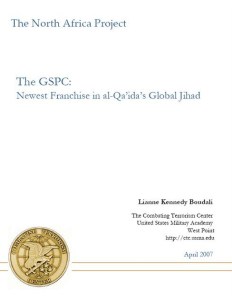The GSPC, one of the most notorious terrorist groups in North Africa, has aligned with al-Qa’ida and changed its name to “The Organization of al-Qa’ida in the Land of the Islamic Maghreb.” The move was precipitated by a forced retreat from urban areas, a loss of support from the Algerian people, and a harsh struggle to fill its ranks with new recruits. Originally part of the Armed Islamic Group (GIA), the GSPC was founded in 1998. As the Algerian security services implemented aggressive counter-terror measures, their numbers took a sharp fall. Since 2003, the group has taken a series of steps to align its activities with al-Qa’ida’s framework for a global jihad, and has declared its loyalty to al-Qa’ida several times since 2003. Ayman al-Zawahiri himself publicly acknowledged GSPC’s affiliation with al-Qa’ida in a video statement released in September 2006. In January 2007, the group announced that it would henceforth be know as the Organization of al-Qa’ida in the Land of the Islamic Maghreb (AQIM).
On April 10, 2007, the new organization claimed credit for two suicide car bomb attacks in Algiers that killed 23 people. Some observers have speculated that North Africa may be the next safe-haven for al-Qa’ida and that European countries may face a greater risk of attack if Algerian terrorist groups expand their base of support in Europe. The alignment of the GSPC with al-Qa’ida represents a significant change in the group’s strategy; however, its decision to join al-Qa’ida’s global jihad should be understood as an act of desperation. This report will analyze the events which necessitated this transition, describe the advantages for both partners, and explain why AQIM will probably not emerge as a major regional threat.
 Skip to content
Skip to content

